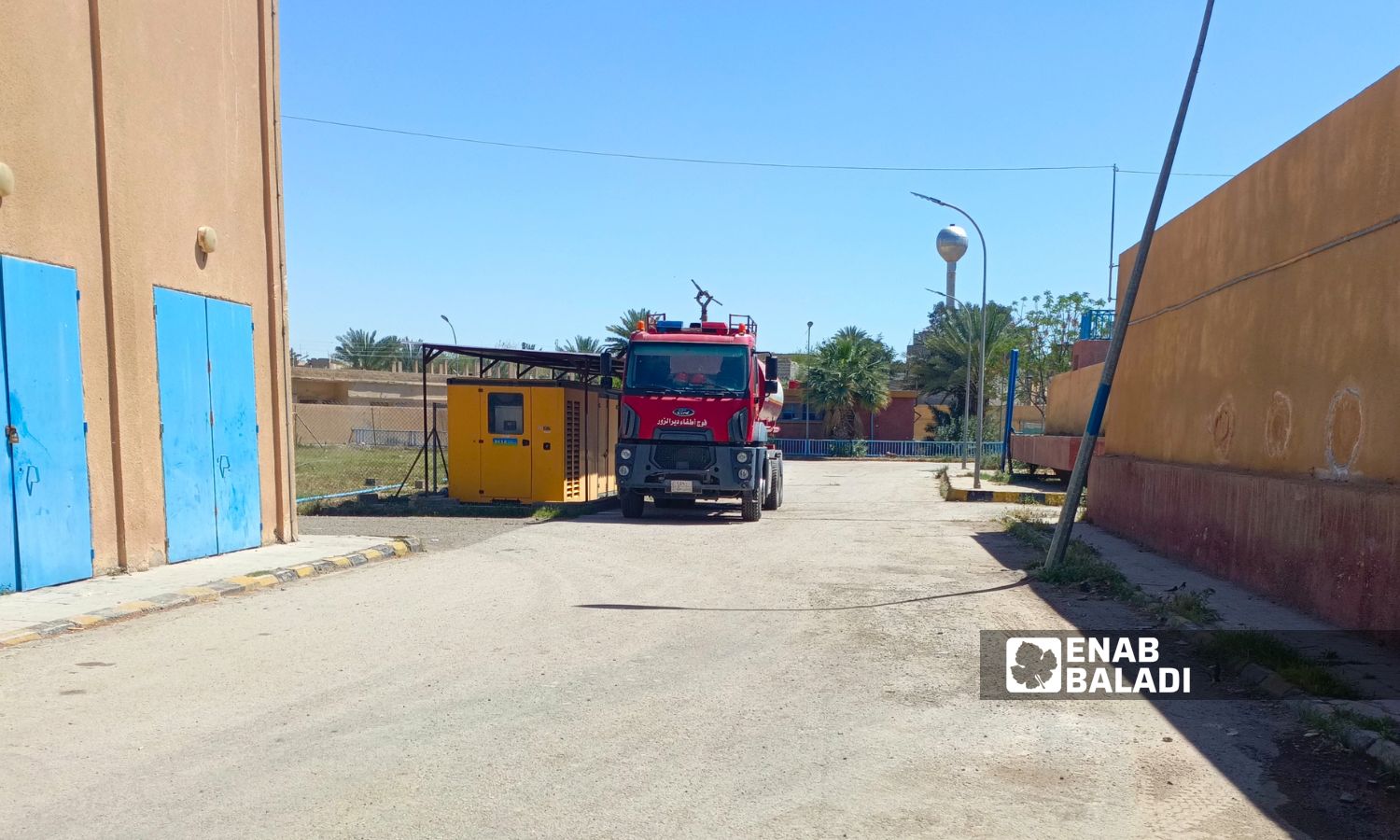



Several drinking water stations in the eastern countryside of Deir Ezzor stopped pumping water to residents after the support by the Services and Fuel Committees affiliated with the Autonomous Administration of North and East Syria (AANES) was lifted, creating a drinking water crisis in the areas fed by these stations.
The suspension of support for the main stations supplying residential areas and vital facilities with water has impacted the towns of Hajin, Sha’fah, Baghouz, Tayyanah, Abu Hamam, Gharanij, and Kashkiyah, as these areas have been without water for about a week.
Local sources told Enab Baladi that the water stations have stopped due to a shortage of the necessary fuel for their operation, in the absence of electrical power.
While the Autonomous Administration did not respond to Enab Baladi‘s inquiries about the reasons for stopping support for the stations, one of the workers at the Hajin water station said that the stoppage of fuel support occurred without an official decision.
The worker, who withheld his name as he is not authorized to speak to the media, added that the water stations now directly follow the “People’s Municipality” (a term used by the Autonomous Administration for municipalities in its controlled areas) in the Eastern Canton (Eastern Sector).
According to the worker, the municipality asked residents in the area to pay 5,000 Syrian pounds monthly per household in the villages and towns of eastern Deir Ezzor countryside to cover the operating expenses of the water stations.
He indicated that residents of al-Kashkiyah in eastern Deir Ezzor collected money for the municipality, which led to the operation of the water station supplying the town with water.
About a week after most stations stopped pumping water, the price of water transported by tankers doubled due to increased demand, amid rising temperatures and the lack of electricity and alternative sources of drinking water.
Majd al-Zari’, a resident of the village of Mouzan in eastern Deir Ezzor, said that the price of a single water tanker reached 40,000 Syrian pounds, with a capacity of ten barrels, while it was 10,000 pounds a week ago.
The exchange rate of the Syrian pound is 14,750 pounds per US dollar, according to the S-P Today website which specializes in monitoring foreign currency movements.
Jamal al-Hassan, a resident of Abu Hamam, told Enab Baladi that securing a water tanker has become a real obstacle, requiring chasing tanker owners on the main road or at water sources. Residents receive poor treatment from water traders due to high demand and the scarcity of tankers.
He added that the municipality did not work to provide tankers to meet residents’ needs.
The worker at the Hajin water station told Enab Baladi that the municipality provided the area with four water tankers to transport water to residents’ homes, but they are naturally insufficient to cover even a part of the needs of these villages’ residents.
Selling drinking water by tankers in the countryside of Deir Ezzor has turned into a popular trade spurred by the recurring crisis due to power outages, prompting many individuals to engage in the profession of selling and distributing water across villages and towns.
Areas under Autonomous Administration control in eastern Deir Ezzor, Syria, repeatedly face service sector crises, manifested in recurrent interruptions of drinking water and electricity supplies.
Water does not reach some residential areas, forcing residents to rely on well water, which causes health issues in the intestines and kidneys, aside from its high price.
Last July, al-Basira, al-Shahil, and Dhiban water stations stopped working due to power cuts caused by the overload on the service line feeding military headquarters and the irrigation station in al-Sabha town, which feeds northern Deir Ezzor extending to al-Hasakah.
A source at al-Basira power station, who withheld his name as he is not authorized to speak to the media, told Enab Baladi in a previous statement that the power outage included water stations, hospitals, and even military points, pending the resolution of all mainline violations.
Last August, several drinking water stations went out of service due to mutual shelling witnessed in the eastern countryside of Deir Ezzor between tribal forces supported by the Syrian regime and Iranian-backed militias on one side, and the Syrian Democratic Forces (SDF) on the other.
At that time, the Syrian Network for Human Rights (SNHR) demanded the parties to immediately halt the escalation and random attacks, and to commit to protecting essential civilian infrastructure, especially water pumping stations, and ensuring their operation to provide residents with clean water.
if you think the article contain wrong information or you have additional details Send Correction